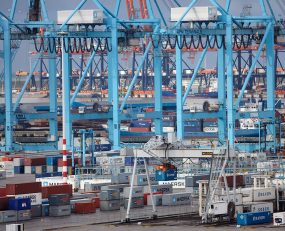
Container traffic growth has been particularly strong at Rotterdam throughout 2017 and is likely to drive expansion at the port in the coming year.
The Port of Rotterdam Authority reported a turnover of €712.1m in 2017, an increase of 4.6% compared to 2016. Net profit amounted to €187m, a fall of 16.6%.
The results from Rotterdam port saw total cargo throughout up by 1.3%, with the port returning to the growth trend seen before 2016. Total tonnage increased from 461m to 467m. This increase in throughput mainly involved the container segment (12.3%). The fall in dry bulk of 2.6% and in wet bulk of 4.1% dragged down the numbers whereas break bulk (Roll on/Roll off and other break bulk) increased by 7%.
Container throughput rose by 10.9% to 13.7m TEUs (Twenty Foot Equivalent Units), as Rotterdam took its share of the European container market to 31% (2017 through to Q3), the highest it has been in almost two decades. For comparison, in neighbouring Belgium, growth at Antwerp was not as impressive, and although its volume increased by 4.1% to 10.45m TEU, Antwerp experienced a 3.6% decline in European transhipments.
Rotterdam ascribed the growth in containers to growing demand in Asia and South America as well as North America. Feeder volume in particular grew strongly (21% in TEU) for all European shipping areas and in particular Scandinavia and the Baltic states.
The incoming and outgoing flows of mineral oils and oil products fell by 10.8% to 79.2m tonnes, mainly due to fall in the exports of fuel oil from Russia as well as the fall of oil going to Asia. LNG throughput on the other hand increased by 16.5%, mainly as a result of higher deliveries to the gas network and the development of LNG bunker facilities. The throughput of chemical products remained stable, while biofuels rose due to a rise in European demand for biodiesel.
Healthy profit development has been a prerequisite for the implementation of the port’s ambitious investment plans. The Port Authority invested a total of €213.8m last year and expects to maintain the high level of investment in the coming year. Important projects include the development of the Hartel Tank Terminal and the changes to the port railway via Thamesweg, eliminating the clash between transport by rail and ocean-going vessels.
In an increasingly digitalised world, the Port Authority is also investing in the development of new digital services that can further strengthen the port of Rotterdam’s competitive position. Its focus lies on optimising logistics processes in the port area and logistics chains that run via Rotterdam. The underlying objective is to facilitate companies and make processes more efficient – improvements that should ultimately increase Rotterdam’s competitive edge.
The Port Authority stated that it plans to develop the port into the foremost location where the energy transition can take shape. To realise this ambition, it facilitates existing, fossil-based industrial parties in the reduction of their CO2 footprint and is also investing heavily in the development of sustainable, circular and bio-based industries and renewable energy.
In its forecast for 2018, Rotterdam expects container volume to continue increasing, although the throughput growth levels will not be as large as those of 2017, suggesting that underlying demand for container shipping looks positive.
Source: Transport Intelligence, March 19, 2018
Author: Violeta Keckarovska